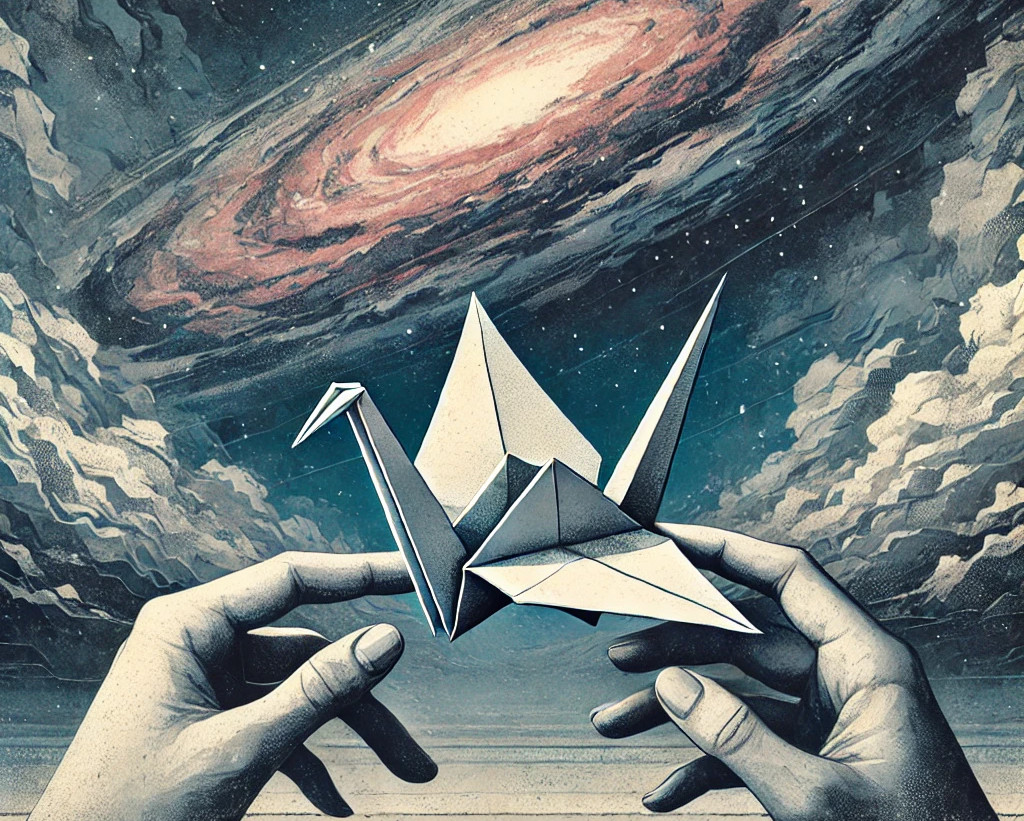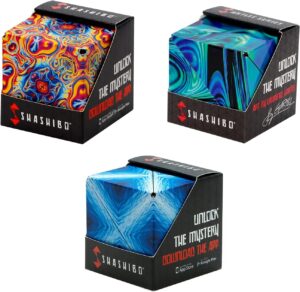Key Takeaways
- Origami mirrors life’s journey: Each fold represents a choice that shapes our path.
- Impermanence teaches acceptance: The ephemeral nature of origami creations helps us embrace life’s transience.
- Mindful folding cultivates presence: The focused act of origami is a form of meditation, anchoring us in the now.
- Creating beauty defies absurdity: Transforming simple paper into art parallels finding meaning in an indifferent universe.
In a universe that often seems chaotic and devoid of inherent meaning, humans continually seek ways to create purpose and understanding. Enter origami, the ancient Japanese art of paper folding. Far from being a mere pastime, origami can serve as a powerful metaphor and practical tool for confronting the absurdity of existence and finding personal meaning in an incomprehensible universe.
Table of Contents
The Absurd Universe and Our Quest for Meaning
Existentialist philosophers like Albert Camus and Jean-Paul Sartre posited that we live in an indifferent universe, one that offers no preset purpose or meaning. This realization can lead to a sense of absurdity – a disconnect between our desire for significance and the apparent meaninglessness of existence.
Yet, rather than succumbing to despair, existentialists argue that we must create our own meaning. But how? This is where origami enters the picture, offering a tangible, meditative practice that mirrors our broader existential journey.
Origami: A Microcosm of Meaning-Making
Transformation Through Choice
Every fold in origami represents a choice, a deliberate action that transforms a flat, featureless sheet into something new. Similarly, our lives are shaped by the choices we make, each decision adding a new “crease” to our existence.
Practical exercise: Start with a square sheet of paper. As you make each fold, consider a significant choice in your life. How has it shaped you?
Embracing Impermanence
Origami creations are inherently ephemeral. They can be unfolded, refolded, or simply discarded. This impermanence reflects life itself – our constructs of meaning are not fixed, but fluid and subject to change.
Reflection point: Create a simple origami form, then unfold it. How does this process make you feel about the temporary nature of our efforts?
Finding Beauty in Simplicity
Origami transforms humble materials into objects of beauty and complexity. This serves as a reminder that meaning and beauty can be found or created even in the most mundane aspects of our existence.
Challenge: Using only materials found in your immediate surroundings, create an origami form. How does this shift your perspective on everyday objects?
Origami as Existential Practice
Mindfulness and Present-Moment Awareness
The focused attention required in origami can serve as a form of mindfulness meditation. By immersing ourselves fully in the act of folding, we practice being present – a key aspect of finding meaning in the here and now.
Daily practice: Spend 10 minutes each day folding a simple origami form. Pay attention to the sensations, thoughts, and emotions that arise during this process.
Embracing Absurdity Through Creation
The very act of creating something delicate and temporary from paper can be seen as an absurd endeavor. Yet, it’s in this seeming absurdity that we find joy, purpose, and meaning – much like how we must create purpose in an ostensibly purposeless universe.
Reflection exercise: After completing an origami project, journal about the parallels between this act of creation and how you create meaning in your life.
Accepting Imperfection
Origami teaches us to accept imperfections. Not every fold will be crisp, not every form will be symmetrical. This acceptance of flaws can translate into a broader acceptance of life’s imperfections and uncertainties.
Practice: Deliberately create an “imperfect” origami form. Reflect on how this challenges your notions of success and meaning.
Conclusion: Folding Our Way to Meaning
Origami offers more than just a way to create paper sculptures. It provides a tangible, meditative practice that can help us navigate the existential challenges of finding meaning in an absurd universe. Through the simple act of folding paper, we can explore profound themes of choice, impermanence, creation, and acceptance.
By engaging with origami as an existential tool, we learn to embrace the absurdity of existence, find beauty in simplicity, and create personal meaning through intentional action. In a world that often seems chaotic and meaningless, the practice of origami reminds us that we have the power to fold meaning into our lives, one crease at a time.
Further Reading
“The Myth of Sisyphus” by Albert Camus – A foundational text in existentialist thought, Camus explores the absurd and the human struggle to find meaning in a meaningless world. His essay on Sisyphus is a profound meditation on the persistence of life and the creative spirit in the face of the absurd.
“Being and Nothingness” by Jean-Paul Sartre – Sartre’s magnum opus delves into the concepts of freedom, bad faith, and the existentialist notion of living authentically. It’s a challenging but rewarding read for those interested in the deeper philosophical aspects of existentialism.
“Zen and the Art of Motorcycle Maintenance” by Robert M. Pirsig – While not strictly an existentialist work, Pirsig’s exploration of the search for quality and meaning in life resonates with existentialist themes. The book blends philosophy with narrative, offering insights into the nature of creativity and the human experience.
“Origami Design Secrets” by Robert J. Lan – For those interested in the technical and creative aspects of origami, Lang’s book provides a comprehensive guide to the art of paper folding. It explores the mathematical principles behind origami and offers a deep dive into the creative process.
“Art and Fear: Observations on the Perils (and Rewards) of Artmaking” by David Bayles and Ted Orland – This book addresses the challenges and fears that artists face in the creative process, offering insights that align with existentialist ideas about authenticity, meaning, and the courage to create in the face of uncertainty.




